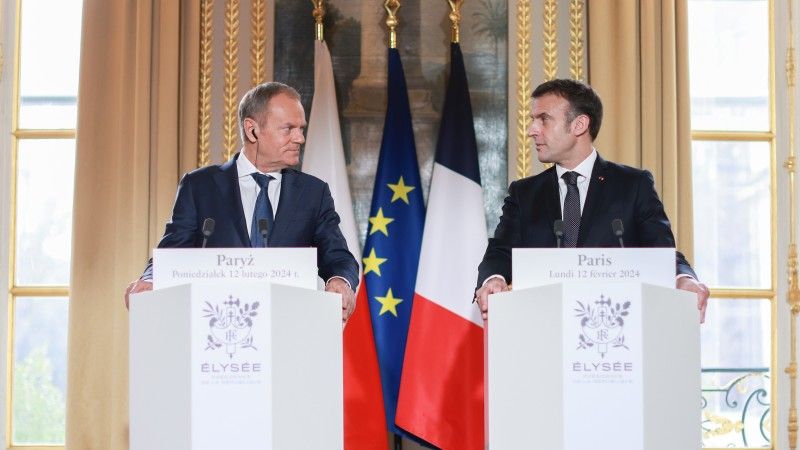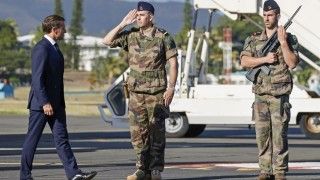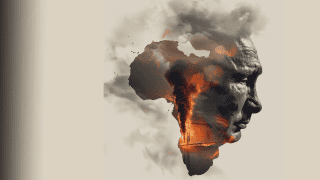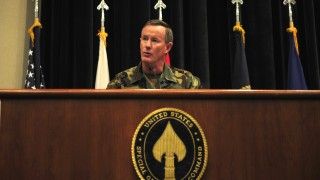- WIADOMOŚCI
Macron in Poland: Is Poland at the Heart of Macron?
The President of France arrives for a visit to meet with Prime Minister Donald Tusk. There are numerous topics of mutual interest, but the priority is to discuss the outcomes of recent meetings with U.S. President-elect Donald Trump and Ukrainian President Volodymyr Zelensky. Additionally, the visit aims to establish common priorities for Paris and Warsaw in the context of Poland’s presidency of the European Union. Discussions on the soon-to-occur deployment of Polish troops to Ukrainian territory are not planned. Macron is currently focused on assuming the role of Europe’s security leader before Trump does.

Russia’s attack on Ukraine in 2022 and Moscow’s aggressive policies towards its neighbours pose the greatest threat to Europe’s post-war security system. Following a reassessment of France’s approach to the Kremlin, Paris has shifted its foreign policy. Over the past three years, the French President has positioned himself as Ukraine’s chief ally. Now, faced with uncertainty about the future approach of Donald Trump’s administration to Europe, NATO, and Ukraine, Macron has begun emphasising the need for Europe’s strategic autonomy. Strengthening collective security within NATO requires support through bilateral and regional cooperation. In this context, Polish-French relations aim to enable both countries to shape Europe’s security policy.
The warmth expressed by Macron himself and in French newspapers in recent months is unprecedented since the start of the 21st century. There is clear lobbying in Paris and vibrant interest in bilateral cooperation. Once again, we are discussing a „new opening” with France, and perhaps this is finally the right moment.
France—and specifically Macron—has several strategic interests in Poland. The key priority is Poland’s EU presidency. Following stagnation under Hungary’s turn at the helm and the faltering French government, real progress in the EU’s work now seems feasible. Paris urgently needs a stable ally in Brussels, and currently, Warsaw, rather than Berlin, appears to be the best candidate. If Tusk and Macron can strike the right chord, they could shape European policy (and partially security) not just for the coming months but for years ahead.
The situation in Ukraine remains a constant item on the agenda. President Macron plans a one-on-one conversation with Prime Minister Tusk to share his insights from his meeting with President Zelensky. At the same time, ideas for peace talks and the future security architecture in Eastern Europe will be discussed. Talks about deploying Polish troops to Ukraine (or elsewhere) in the coming months are excluded. Paris has been informed that Polish instructors will train Ukrainians in Poland (and as needed in other EU countries), but for now, a military mission in Ukraine—under Macron’s leadership—is ruled out. However, Poland largely approves the idea to ensure future deterrence against Russia. Additionally, NATO is planning large-scale exercises in May 2025, involving approximately 90,000 troops from member states.
Emmanuel Macron is keen to develop a new European approach after the U.S. elections. His recent visit to the Middle East, the invitation of over 50 heads of state and government to Paris last week, and his statements about Europe’s long avoidance of bearing the burden of its security, along with the immediate need for a European pillar of transatlantic security, are just some examples of groundwork being laid. Macron aims—once again—to try to be the leader of European security and preempt any (and all) decisions by Donald Trump. Therefore, a series of bilateral meetings in the region is seen as a way to secure priority in all decision-making contexts, including Ukraine and a potential „new” approach to the Russian Federation.
The EU-Mercosur agreement is also an important topic. This pact between the EU and Argentina, Brazil, Paraguay, and Uruguay eliminates tariffs to open markets. However, European farmers are at risk of losing out due to a flood of cheap agricultural products from South America, such as beef and soybeans, which are cheaper to produce and often do not meet European environmental and animal welfare standards. Both France and Poland currently oppose this agreement.
Strengthening bilateral cooperation is the top priority. Sixteen years have passed since the signing of the Polish-French strategic partnership declaration. On February 12, 2024, during a meeting between Prime Minister Donald Tusk and President Emmanuel Macron, the preparation of a new bilateral treaty was announced to replace the 1991 agreement. Work is currently underway to finalise this new agreement. Paris envisions several initiatives where its role will be pivotal.
These include building nuclear power in Poland, selling submarines (the famous „Orka”), supplying advanced defence systems, including anti-aircraft and anti-missile systems, joint arms projects such as cruise missiles, and technology transfers in the defence industry. The development of hydrogen systems and renewable energy is significant, as Macron supports achieving climate pact goals. In economic cooperation, key priorities include investments by French companies in Polish industry and infrastructure, such as high-speed rail development and digital technologies.
It’s no secret that Macron and Trump are rivals. This rivalry may take the form of healthy competition where both act in mutual interest or turn into a battle of individual ambitions, negatively affecting other allies, particularly Ukraine and NATO’s eastern flank. Macron’s visit to Poland is undoubtedly a signal that France is committed. Now Paris is the one seeking, proposing, and flattering.
See also

Warsaw watches carefully and must thoughtfully weigh what is best for itself. If Macron comes, Trump will surely follow, likely in the first half of 2025. It’s time to adopt the strategy the French have used for years: „The art of diplomacy lies in cutting the cake so that everyone believes they got the biggest piece.” In recent years, France has hosted the largest and most spectacular events where Poland often had no seat at the table. Now, Poland is being given a personal invitation and a large piece of the cake. It’s time to take a bite, but one must remember that every frog praises its own pond.


















